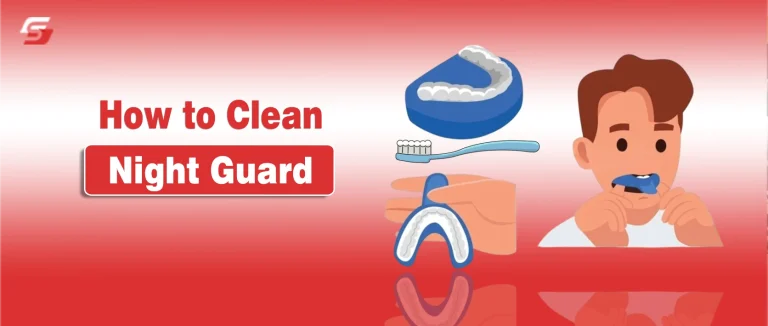A night guard may look like a simple dental accessory, but it plays a crucial role in protecting teeth from the constant pressure and friction caused by nighttime grinding (bruxism).
Many people wear it nightly without realizing that improper cleaning or careless handling can turn this protective device into a breeding ground for bacteria. The irony is that a tool meant to protect your oral health can harm it if not maintained correctly.
This guide uncovers the precise dentist-approved methods, hidden cleaning mistakes, and long-term maintenance habits that keep your night guard clear, odor-free, and effective, so you can rest easy knowing your smile is truly protected.
Why Cleaning Your Night Guard Matters
A night guard is a dental device designed to protect teeth from grinding, clenching, or jaw tension during sleep. Regular deep teeth cleaning and also of night guard are essential to maintain hygiene, durability, and safety. A clean night guard prevents bacterial buildup, eliminates unpleasant odors, and ensures consistent comfort during wear.
Neglecting its maintenance allows harmful microorganisms to thrive, increasing the risk of oral health problems like gum irritation, plaque buildup, and infections. Consistent cleaning also extends the lifespan of the night guard and preserves its fit, helping users maintain better overall oral hygiene.
What Happens If You Don’t Clean Your Night Guard Regularly?
A night guard that is not cleaned regularly accumulates bacteria, plaque, and saliva residue. These substances create a breeding ground for harmful microorganisms such as Streptococcus mutans and Candida albicans, which can lead to oral infections and gum irritation.
Over time, the buildup of these contaminants causes the night guard to develop foul odors, discoloration, and an unpleasant taste. The unclean night guard surface can also transfer bacteria back to the mouth, increasing the risk of cavities, gingivitis, and throat irritation. Without regular cleaning, the device’s material may degrade faster, reducing its protective effectiveness and fit.
How Does Proper Cleaning Improve Oral Hygiene and Comfort?
Proper night guard cleaning removes food debris, saliva film, and microbial buildup, helping maintain a hygienic oral environment. By eliminating bacterial growth, cleaning reduces the risk of bad breath, gum inflammation, and enamel erosion.
A clean night guard ensures that the device remains smooth and odor-free, which directly enhances nighttime comfort and usability.
Regular maintenance with gentle brushing or soaking in non-abrasive solutions keeps the thermoplastic material flexible and prevents surface warping.
Consistent hygiene care also supports healthy oral pH balance and contributes to fresher morning breath and improved overall dental wellness.
Key Do’s and Don’ts for Night Guard Maintenance
| Do’s | Don’ts |
| Rinse the night guard with cool water after every use. | Avoid soaking the night guard in hot or boiling water. |
| Brush gently with a soft-bristled toothbrush and mild cleanser. | Do not use alcohol-based or chemical cleaners. |
| Store in a ventilated case after air drying completely. | Avoid storing in closed or wet containers. |
| Inspect for cracks or wear monthly. | Do not ignore persistent odor or surface changes. |
| Bring your night guard to dentist visits for inspection. | Avoid using abrasive toothpaste or hard brushes. |
Can an Unclean Night Guard Cause Bad Breath or Mouth Infections?
An unclean night guard is a major contributor to bad breath (halitosis) and oral infections. When bacteria and plaque accumulate on the guard, they release sulfur compounds responsible for unpleasant odors. These bacteria can also infect the gums or soft tissues, leading to gingivitis, stomatitis, or yeast overgrowth.
Moist environments, like the surface of an unwashed night guard, promote the rapid multiplication of microbes. Using an unclean guard daily reintroduces these harmful organisms into the mouth, disrupting the natural oral microbiome and increasing the risk of chronic bad breath and mouth irritation.
How to Properly Clean Your Night Guard at Home
A night guard requires consistent cleaning to prevent bacteria buildup and maintain durability. Cleaning the device at home helps preserve its fit, clarity, and comfort. A structured routine using mild cleaning agents, soft brushes, and cool water ensures that the guard remains hygienic without damaging its thermoplastic surface.
Step-by-Step Daily Cleaning Routine
A night guard daily cleaning routine should be followed every morning to prevent bacteria buildup and stains.
Daily steps include:
- Rinse: Rinse the night guard under cool running water to remove saliva and loose debris.
- Brush: Use a soft toothbrush and non-abrasive toothpaste or mild soap to gently clean all surfaces.
- Rinse again: Remove any soap or residue with clean, cool water.
- Dry: Allow the night guard to air dry completely on a clean surface.
- Store: Place the dried guard in a ventilated storage case to prevent bacterial growth.
Following this structured routine maintains cleanliness, prevents odor, and prolongs the guard’s effectiveness.
What Temperature of Water Should Be Used to Clean a Night Guard?
The temperature of water used during cleaning must be cool or lukewarm. Hot or boiling water can deform the thermoplastic structure, causing poor fit and reduced comfort. Using cool water ensures that the night guard stays intact, durable, and effective in protecting teeth from grinding and clenching.
Should I Soak My Night Guard, and for How Long?
A night guard soak helps disinfect the surface and remove embedded bacteria. It can be done daily or several times per week using one of these solutions:
- Denture cleaning tablet solution: Soak for 10–15 minutes.
- Hydrogen peroxide and water mix (1:1 ratio): Soak for 5–10 minutes.
- White vinegar and water solution (1:1 ratio): Soak for 15 minutes, then rinse thoroughly.
After soaking, rinse the night guard under cool water and let it dry completely. Avoid over-soaking, as prolonged exposure can weaken or discolor the material.
How Often Should I Clean or Disinfect My Night Guard?
A night guard should be cleaned daily and disinfected weekly for best hygiene. Daily cleaning removes saliva and food residue, while weekly soaking eliminates deeper bacterial buildup.
Overuse of alcohol-based cleaners should be avoided because they can degrade the plastic material. Consistent care maintains the night guard’s clarity, comfort, and protective performance.
Best Cleaning Agents and Safe Products to Use For Night Guard
A night guard must be cleaned with gentle and non-abrasive agents to protect its structure and prevent bacterial buildup. Using the right cleaning solutions preserves the clarity, fit, and comfort of the night guard while preventing damage to the material.
Safe options include mild soaps, vinegar, hydrogen peroxide, and denture cleaning tablets, each offering disinfecting properties without harsh effects. Understanding which products to use, and which to avoid, ensures long-term hygiene and durability for the dental night guard.
Can I Clean My Night Guard with Vinegar or Hydrogen Peroxide?
Vinegar and hydrogen peroxide are both effective natural disinfectants for cleaning a night guard.
- White vinegar helps remove mineral buildup, odors, and bacterial film. To clean, soak the night guard in a mixture of equal parts white vinegar and water for 15–20 minutes, then rinse thoroughly.
- Hydrogen peroxide kills bacteria and eliminates stains on the night guard surface. It can be used alone or diluted with water in a 1:1 ratio for a 5–10 minute soak.
These cleaning agents should not be used together in the same session, as mixing them can create unnecessary chemical reactions. Both solutions are effective for disinfecting without degrading the guard’s thermoplastic material when used properly.
What Kind of Soap Is Safe for Cleaning a Night Guard?
A mild liquid soap or clear antibacterial soap is safe for cleaning a night guard daily. The soap should be fragrance-free, non-abrasive, and free from alcohol or strong chemicals.
Using a small amount on a soft toothbrush helps remove plaque, saliva, and odor without scratching the surface. Dish soaps such as Castile soap or gentle hand soaps work best.
After brushing, rinse the night guard thoroughly under cool water to eliminate all residue. Using harsh or scented soaps can leave residue and cause irritation inside the mouth.
Are Denture Cleaning Tablets Effective for Night Guards?
Denture cleaning tablets are safe and effective for disinfecting a night guard, provided they are used correctly. These tablets release mild effervescent agents that remove bacteria, stains, and odor. To clean, dissolve one tablet in a cup of cool or lukewarm water and soak the night guard for 10–15 minutes.
After soaking, rinse the guard thoroughly and allow it to air dry. Denture tablets are convenient for weekly deep cleaning but should not replace daily brushing. Avoid using them too frequently, as repeated chemical exposure can reduce the material’s transparency and flexibility over time.
Can I Use Mouthwash or Baking Soda for Cleaning?
Mouthwash can be used occasionally to freshen and disinfect a night guard, but only if it is alcohol-free. Alcohol-based mouthwashes can weaken or discolor the guard’s material. To clean safely, dilute the mouthwash with water in a 1:1 ratio and soak the night guard for 10 minutes, then rinse completely.
Baking soda is another effective cleaning option for odor removal and mild whitening. To use, mix one tablespoon of baking soda with water to form a paste, gently brush the night guard with a soft toothbrush, and rinse thoroughly. Both methods help neutralize odor-causing bacteria and maintain a clean surface when used moderately.
Which Cleaning Products or Ingredients Should Be Avoided?
Certain cleaning products can damage or weaken a night guard’s structure and should be avoided.
Unsafe substances include:
- Hot or boiling water – causes warping and distortion.
- Alcohol-based mouthwash – dries and cracks the material.
- Bleach or harsh chemicals – degrade and discolor the surface.
- Abrasive toothpaste or powders – scratch and reduce transparency.
- Dishwasher or ultrasonic cleaners – expose the night guard to excessive heat and vibration.
Avoiding these substances ensures the night guard remains smooth, comfortable, and hygienic for long-term use. Using only mild, non-abrasive cleaners preserves both the functionality and lifespan of the dental appliance.
Tools and Equipment for Cleaning Night Guards
Proper cleaning tools and equipment are essential to maintain the hygiene, clarity, and structure of a night guard. Using the right tools prevents scratches, removes bacteria effectively, and helps extend the appliance’s lifespan.
The main tools include a soft-bristled toothbrush, mild cleaning solutions, and a ventilated storage case. Some users may also consider specialized devices like ultrasonic cleaners for deep disinfection. Understanding how each tool functions ensures the night guard stays clean, odor-free, and safe for daily use.
What Type of Toothbrush Should I Use?
A soft-bristled toothbrush is the best tool for cleaning a night guard. Soft bristles remove plaque, saliva residue, and bacteria without scratching the material’s surface. Using a medium or hard-bristled brush can create micro-scratches, which may harbor bacteria and degrade the night guard’s clarity.
A small, compact toothbrush head works best for reaching curved or inner areas of the guard. Electric toothbrushes should generally be avoided, as their vibrations may cause wear or deformation over time. The soft manual brush remains the safest and most effective option for daily cleaning.
Should I Use a Separate Toothbrush Only for My Night Guard?
A dedicated toothbrush should always be used exclusively for cleaning a night guard. Using the same toothbrush for teeth and the night guard can transfer bacteria, toothpaste residue, and food particles to the device, increasing the risk of contamination.
A separate toothbrush also ensures consistent hygiene by avoiding contact with oral debris. Ideally, the night guard cleaning toothbrush should be replaced every two to three months, just like a regular toothbrush, to maintain its cleaning effectiveness. Keeping it stored in a clean, dry area further prevents microbial buildup.
Can I Use an Ultrasonic Cleaner for Night Guards?
An ultrasonic cleaner can be used for deep cleaning of night guards, but with caution. Ultrasonic cleaners use sound wave vibrations to remove bacteria and plaque from surfaces. They are effective for professional-level disinfection when paired with mild cleaning solutions and cool or lukewarm water.
However, overuse or exposure to strong cleaning agents inside the device may damage the night guard’s thermoplastic structure. Ultrasonic cleaners should be used occasionally, such as once a week, rather than daily. For regular cleaning, a soft toothbrush and mild soap remain the safest and most recommended approach.
Common Mistakes and Damage Prevention Tips
Proper night guard maintenance requires careful cleaning methods to preserve its structure, clarity, and fit. Many users unintentionally damage their night guards by using high temperatures, harsh chemicals, or abrasive cleaning tools.
These practices can warp, crack, or discolor the material, reducing comfort and durability. Following safe cleaning habits and avoiding common mistakes ensures the night guard remains hygienic, effective, and long-lasting.
Can Hot or Boiling Water Damage a Night Guard?
Hot or boiling water can severely damage a night guard. The thermoplastic material used in most night guards softens under high heat, causing warping and distortion. Once the material loses its shape, the night guard no longer fits properly and can create discomfort or pressure on the teeth.
Cleaning should always be done with cool or lukewarm water to preserve the structure and flexibility of the device. Even short exposure to hot water, such as rinsing after soaking, can permanently alter the fit. Avoiding heat contact is one of the most important steps in night guard damage prevention.
Why Should I Avoid Harsh or Chemical-Based Cleaners?
Harsh or chemical-based cleaners such as bleach, alcohol, or ammonia can degrade the surface of a night guard. These chemicals break down the acrylic or thermoplastic polymers that provide durability and comfort.
Repeated use of strong chemicals can cause discoloration, surface cracks, and a rough texture, making the night guard uncomfortable to wear. Additionally, chemical residues left behind can irritate gums and soft tissues.
Safe alternatives include mild liquid soap, white vinegar, or denture cleaning tablets, which disinfect without damaging the material. Using gentle cleaners ensures both hygiene and longevity.
Does Abrasive Toothpaste Scratch or Weaken Night Guards?
Abrasive toothpaste can scratch and weaken the surface of a night guard. Many whitening and tartar-control toothpastes contain particles designed to remove stains from enamel, but these same particles erode the smooth plastic surface of the guard.
Scratches create small grooves where bacteria can accumulate, leading to odor and plaque buildup. Over time, these abrasions reduce the clarity and lifespan of the night guard. Only non-abrasive toothpaste or mild dish soap should be used with a soft-bristled toothbrush to clean the device safely without surface damage.
What Cleaning Mistakes Can Reduce the Lifespan of a Night Guard?
Several cleaning mistakes shorten the lifespan of a night guard. Common errors include:
- Using hot water – causes warping and loss of shape.
- Applying harsh chemicals – weakens and discolors the material.
- Brushing with abrasive toothpaste – scratches the surface and promotes bacterial buildup.
- Failing to dry before storage – allows mold and odor to develop.
- Skipping daily cleaning – causes plaque accumulation and microbial growth.
Consistent gentle cleaning, complete drying, and proper storage extend the night guard’s durability and maintain oral hygiene. Following these prevention tips keeps the guard comfortable, clear, and effective for long-term use.
Final Dentist Tips for Long-Term Care
Long-term care of a night guard directly affects its hygiene, comfort, and protective performance. Dentists recommend maintaining a consistent cleaning routine, proper storage method, and timely replacement to prevent bacterial buildup and material degradation. Many modern dental practices educate patients on proper care to help avoid cleaning mistakes that can damage oral appliances like night guards.
FAQs
Yes, a UV sanitizer can help kill surface bacteria, but it should be used as a supplement to regular brushing and soaking, not as a replacement.
No, bathrooms are humid environments that can encourage bacterial growth; always store the night guard in a cool, dry area instead.
Yes, but ensure the case is ventilated and clean, and avoid sealing it in plastic bags that trap moisture and promote mold.
Absolutely. Soft night guards need gentler care with mild soap, while hard acrylic guards can handle short soaks in disinfecting solutions.
No, alcohol-based products can dry out or crack the material, making the night guard uncomfortable and less durable.










